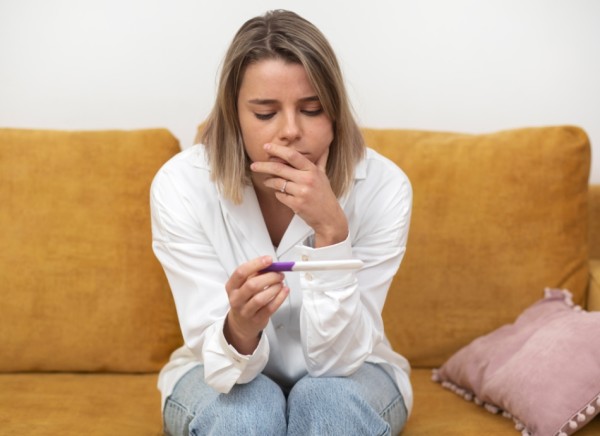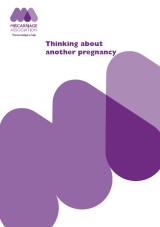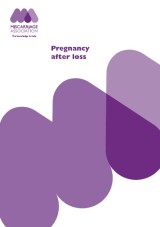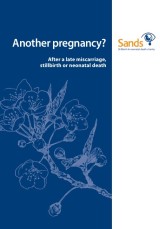You can now add Healthify as a preferred source on Google. Click here to see us when you search Google.
Pregnancy after miscarriage
Key points about pregnancy after miscarriage
- A miscarriage is the loss of a pregnancy in the first 20 weeks.
- Most people who’ve experienced a miscarriage will go on to have a healthy baby.
- It can take several weeks for your body to recover after a miscarriage.
- You should wait until you’re physically and emotionally ready before you try to get pregnant again.
- There are things you can do to help towards having a healthy pregnancy.

A miscarriage or whakatahe is a pregnancy that ends on its own before 20 weeks. It's common and about 1 in every 5 pregnancies end in miscarriage. Most miscarriages happen in the first trimester (up to 14 weeks of pregnancy). Most people who’ve experienced a miscarriage will go on to have a healthy baby. Read more about miscarriage.
It’s physically possible to get pregnant again as soon as 2 weeks after a miscarriage. However, it may take several weeks for your body to recover physically and emotionally after a miscarriage. It’s also not advisable to have sex while you are still bleeding after a miscarriage, to reduce the risk of infection.
You may have spotting or bleeding for up to a month following a miscarriage, and if you’ve had pregnancy-related symptoms, such as nausea (feeling sick), they may take a few days to settle down.
After a miscarriage it’s normal to experience emotions such as grief, anger, guilt or anxiety. You should wait until you’re physically and emotionally ready before you try for another baby.
If you’ve had recurrent miscarriages (3 or more), your healthcare provider may want to do some tests to find out if there’s a cause for this. Read more about recurrent miscarriages.
Deciding if, and when, you want to get pregnant again can be difficult as you come to terms with what’s happened.
You may feel anxious or scared about being pregnant again. Take your time to process your emotions. Talk to your partner, or a good friend if you have no partner, and share your feelings. You may find it helpful to talk to other people you trust too, people you feel comfortable with knowing they won’t put pressure on you to make a decision until you’re ready.
Pregnancy after a loss is often a very different experience as you know that things can go wrong. Talking to others who have been through this may help your decision-making and prepare you for what’s to come if you do decide to get pregnant again. There is support available if you want to talk to somebody about your loss.
You can also talk to your healthcare provider about trying again and ask them any questions you may have.
If there aren’t any medical reasons to wait, you can start trying for another pregnancy when you feel physically and emotionally ready.
After a miscarriage, it’s best to wait to have sex until all your symptoms, such as pain or bleeding, are gone because there’s a risk of infection. It’s also good to wait until after you’ve had a negative pregnancy test before trying to get pregnant again. That way you can be sure that the miscarriage is complete and that your next positive pregnancy test is a new pregnancy.
If you normally have regular periods, you’ll probably get your next period about 4 to 6 weeks after a miscarriage. However, you might ovulate before you have a period so you might be fertile in the first month after a miscarriage. This means it’s best to use contraception until you’re ready to get pregnant again. It can take a few periods for your cycle to return to normal.
Some people like to wait until after their first period as it can make it easier to work out the dates of their pregnancy. However, some people find that conceiving again as soon as possible is an important part of their recovery. There is no ‘right’ thing to do and you should do what works for you. Getting pregnant before having a period doesn’t increase the risk to your pregnancy.
Talk to your healthcare team if you’ve had a second trimester loss (a later miscarriage) or recurrent miscarriages (3 or more). If you’re having tests or investigations for these, it can be better to wait until they’re finished before trying again.
It’s natural to worry about having another miscarriage. It may help to know that if you’ve had an early miscarriage (that is, one occurred in the first trimester), there’s a good chance that your next pregnancy will be successful. Couples who have had 1 miscarriage have an 80% chance of a successful pregnancy.
If you’ve had a late miscarriage (that is, a miscarriage in the second trimester), or recurrent miscarriages (3 or more miscarriages), your healthcare provider can refer you to a specialist doctor such as an obstetrician/gynaecologist or a reproductive endocrinologist. They will arrange tests and talk to you about your chances of having another miscarriage or a successful pregnancy.
Usually a miscarriage can’t be avoided but read more about what you can try to lower the risk of miscarriage. Examples are not smoking or drinking alcohol, maintaining a healthy body weight and reducing your caffeine intake. A miscarriage is not caused by being stressed at work or an argument with your partner or doing heavy lifting.
Having a healthy lifestyle can help towards having a healthy pregnancy.
- Drink plenty of water and eat a balanced diet.
- Take a folic acid supplement.
- Do regular moderate exercise such as walking, jogging, swimming and yoga. Check with your doctor for specific advice related to your health and pregnancy.
- Avoid alcohol, nicotine, and illegal drugs, and cut down your caffeine intake.
- Keep up with your antenatal appointments and call your lead maternity carer (LMC) if you’re worried about your health or your baby’s health.
- Keep any long-term conditions, such as diabetes, under control – take your medications as directed.

Image credit: Freepik
Pregnancy after miscarriage can be a time of mixed emotions. It may be hard to feel happy and excited if you find yourself experiencing guilt or sadness, or anxiety about miscarrying again. Remember that this baby isn’t replacing the one you lost, it’s a new and different life.
It’s important to be kind to yourself and give yourself time to process your feelings. It’s likely to be hard for your partner too. Support each other, and reach out to trusted whānau or friends or support organisations to help you through. You might like to consider talking to a therapist if you’re experiencing difficult emotions, or if you feel anxious or down about your new pregnancy.
Pregnancy after miscarriage(external link) Miscarriage Support, NZ
Pregnancy after miscarriage(external link) Tommy’s The Pregnancy and Baby Charity, UK
Trying again(external link) Miscarriage Association, UK
Pregnancy after miscarriage(external link) Miscarriage Association, UK
Brochures
Another pregnancy? After a late miscarriage, stillbirth or neonatal death(external link) Sands, UK, 2014
Thinking about another pregnancy(external link) Miscarriage Association, UK, 2024
Pregnancy after loss(external link) Miscarriage Association, UK, 2024
References
- Pregnancy after miscarriage – answers to your questions(external link) Healthline, US, 2023
- What happens after a miscarriage? An ob-gyn discusses the options(external link) The American College of Obstetricians and Gynecologists, US, 2024
- Getting pregnant after miscarriage, ectopic or molar pregnancy(external link) Tommy’s The Pregnancy and Baby Charity, UK
- Trying again(external link) Miscarriage Association, UK
- Pregnancy after miscarriage(external link) Miscarriage Association, UK
Brochures

Thinking about another pregnancy
Miscarriage Association, UK, 2024

Pregnancy after loss
Miscarriage Association, UK. 2024
Credits: Healthify editorial team. Healthify is brought to you by Health Navigator Charitable Trust.
Reviewed by: Dr Judy Ormandy, Obstetrician and Gynaecologist, Capital & Coast District Health Board
Last reviewed:






